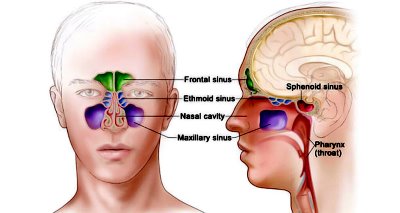Nose and Sinuses Cancer
Cancer can potentially affect various parts of the body, including the nose and sinuses. The nasal cavity and paranasal sinuses are areas where cancer can develop. The most common type of cancer in these areas is squamous cell carcinoma, but other types such as adenocarcinoma, adenoid cystic carcinoma, and melanoma can also occur.
Symptoms of nasal and sinus cancer may include:
- 1. Persistent nasal congestion or blockage
- 2. Chronic sinus infect
- 3. Nosebleeds
- 4. Decreased sense of smell
- 6. Swelling or lumps on the face or inside the nose
- 7. Watery or bloody discharge from the nose
- 8. Numbness or tingling in the face

If you suspect nasal or sinus cancer, it is important to consult a healthcare professional for a thorough evaluation. Diagnosis typically involves a physical examination, imaging studies (such as CT scans or MRI), and sometimes a biopsy to confirm the presence of cancer.
Treatment options for nose and sinus cancer may include surgery, radiation therapy, and chemotherapy, depending on the type and stage of cancer. The specific approach will be determined by a multidisciplinary team of healthcare professionals, including surgeons, oncologists, and radiation therapists.
Early detection and prompt treatment can improve outcomes for individuals with nasal and sinus cancer. If you or someone you know is experiencing symptoms suggestive of nasal or sinus cancer, it is crucial to seek medical attention for a proper diagnosis and appropriate management.


 Max Hospital, Vaishali, Gaziabad
Max Hospital, Vaishali, Gaziabad